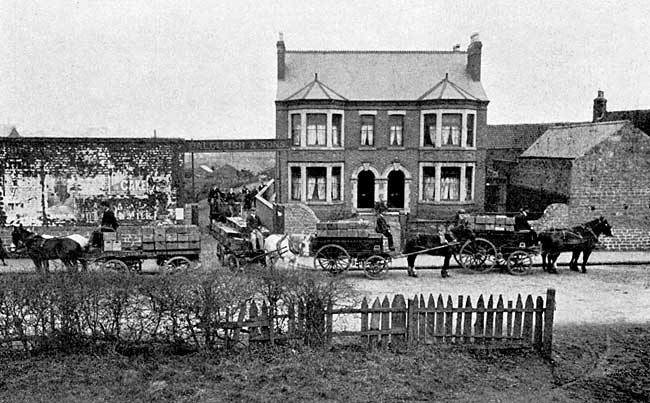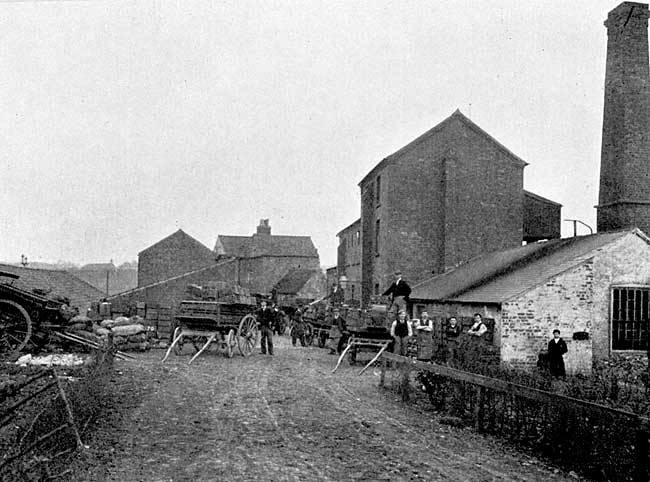< Previous | Contents | Next >
Messrs. DALGLEISH & SONS,
Nervon Mineral Water Works, and Hop Bitter Brewers, Bobbers' Mill, NOTTINGHAM.
Telephone No, 1599.

Front Entrance to Works and Residence.
A REMARKABLE and noteworthy feature of the social reforms of the Victorian age has been the trend of popular favour in the direction of light and non-intoxicating beverages in substitution for those which held the field but a short generation ago; and in meeting this requirement of every-day life few firms have been more successful than Messrs. Dalgleish and Sons, who have introduced in their speciality "Nervon Tonic," one of the most invigorating of drinks, combining the properties of a preventive against fatigue, while also counteracting the effects of alcohol. The business was founded ten years ago, and until 1895 was carried on by Messrs. Dalgleish and Williams, when a dissolution of partnership took place, the latter gentleman retiring, and his place being taken by the sons of the senior partner, trading under the present designation. The premises first occupied by the firm were in Bridlington Street, but the accommodation at that address becoming insufficient for the increasing requirements of the trade the firm removed to their present establishment at Bobber's Mill, situated in the western suburb of the city. The building, formerly used as a brewery, stands in grounds two acres in extent, and comprises a block of two sections, facing each other, of somewhat irregular formation. At the entrance to the grounds is the residence of the senior partner—one of two well-built villas facing the Nuttall Road. Adjoining the principal building of the factory is an annexe, surmounted by a huge tank of one thousand gallons capacity, into which the water is pumped, and then distributed by gravitation to all parts of the factory. The water supply is derived from a well sunk on the premises, and its purity and softness are testified by the analysis of a specialist, who reports that the chemical character of the fluid, by its freedom from chalk, is eminently adapted to the manufacture of aerated beverages. Notwithstanding its initial purity, the water is filtered through charcoal before it is used for the production of the various beverages, and therefore, as far as the basis of manufacture is concerned, is beyond suspicion. On commencing our tour of inspection we are first introduced to the boiler house, in which is erected a large tubular boiler of the Galloway make, of twenty-five horse-power, for generating steam for the engine and heating the water used in bottle washing and other purposes. Near to this is a fine horizontal engine of eight-horse power. The manufactory proper adjoining is a spacious and well-arranged building, with a plant of modern machinery combining all the latest improvements, having an output capacity of seventeen thousand bottles per ordinary working day.
In the preparation of aerated beverages, as exemplified in this factory, the carbonic gas, already manufactured and stored in large cylinders, is first subjected to a process of purification, and is then washed in glass vessels specially designed, where the slightest impurity is at once detected. The water, conveyed through block-tin piping, meets the gas in the aerating machine, which consists of two gun-metal cylinders, also lined with block tin; and when the aerating process is completed, the fluid is passed on to the hand fillers, of which there are three in use. (Since the photograph illustrating the interior of the factory was taken, Messrs. Dalgleish and Sons have found it necessary to lay down additional steam-filling machinery, giving an increased output of 140 dozen per hour.) From the floor above more tin-lined pipes convey the syrups from the earthenware tanks in which they are stored, and these are injected into the bottles by automatic contrivance regulating the exact quantity required for each bottle. The laboratory—where the flavouring essences, syrups, etc., are prepared—is another feature of the factory, the whole of the ingredients used being specially selected of the purest and most wholesome quality, the sugar being invariably of the best loaf, and all fruits, etc., of the freshest. And here we may digress a little in order to mention another noteworthy feature of importance in the arrangements. As previously intimated, the whole of the piping, and in fact every vessel employed in the process of manufacturing, is protected by block-tin lining. This is intended as an absolute safeguard against the dangers arising from metallic contamination, and those interested in the subject will doubtless remember the results of the investigations by the special commissioner of the Lancet, which went to prove that ordinary water containing an excess of carbonic acid gas is capable of taking into solution distinct quantities of lead, copper, zinc, but not of tin. For this reason the latter metal is invaluable for lining purposes, the acids contained in the syrups being also calculated to promote metallic contamination, and therefore Messrs. Dalgleish and Sons have wisely resolved upon the invariable use of this material in every part of their system. In the factory, besides the plant already referred to, is a novel and ingenious filling machine by the Bottle Seal Company, of London and Baltimore, for bottling and sealing the firm's celebrated registered and patented "Nervon Tonic," another for syphon filling, and bottle-washing tanks, with rinsing appliances attached. The remainder of the ground-floor premises is occupied as the warehouse, and in a room above there is storage accommodation for between two and three thousand dozens of bottles—this being the average quantity held to meet current requirements. A hoist is fitted for the conveyance of goods to each floor, and shoot facilities for the loading of the delivery carts in the yard beneath.

Exterior of Factory and Yard.
The Brewing department for hop bitters and stone ginger beer is at the top of the building, and contains an excellent equipment of plant, including a large copper heated by steam, together with three fermenting vats, one of which holds 400 and the other two 100 gallons each. The process of brewing is of special interest in many respects, the hop bitters being transferred from the vats to the barrels through one of Maignen's rapid filters, obviating the addition of finings, so frequently proving deleterious to the product. The barrels are then conveyed to the hop bitters bottling stores on the opposite side of the yard. This building, erected about two years ago to cope with the increased demand for this speciality of the firm, is furnished with a plant including a double-cylinder carboniser, a three-horse-power steam engine recently put down, and an improved filling machine. In a room above the process of labelling is continuously carried on, and the hop bitters, when completed, are placed in store rooms where large quantities are held. In the summer months about 3,000 dozens are stored, while the cellars have a capacity nearly double this quantity. An extensive range of shedding is erected for the delivery vans and carts, and there are also well-arranged stables, smith's forge for shoeing horses, and for the work of general repairs, and, in fact, every convenience for making the establishment self-contained in the various departments. Concluding our tour with a visit to the well-appointed office, we are invited to test by personal experience the merits of some of the several beverages we had witnessed in course of preparation. Of these may be singled out as the leading items the firm's famous "Nervon Tonic," a beverage which possesses all the valuable medicinal properties of pure quinine, and is highly commended by the medical faculty for the nerves and indigestion, and, as a stimulant, a preventive against fatigue, and, most important of all, as counteracting the effects of alcohol. This drink was awarded a silver medal for purity and excellence at the Notts Industrial Exhibition, 1891, and received a similar distinction at the Scarborough Exhibition in the present year. The "Nervon Tonic " has been subjected to analysis by the most eminent specialists, viz.—Edgar B. Truman, M.D., F.C.S., late analyst for the borough of Nottingham, and C. J. Fowler, M.D., F.S.S., London—both of whom pronounce the quality and purity of the beverage alike, second to none. In the hop bitters manufactured by the firm—which upon being analysed was found to contain but 1¾ per cent, of proof spirit—we sampled another very excellent beverage, a qualification which also applies to their ginger wine, which is strongly recommended for its purity and flavour, and as a non-alcoholic drink, and "Alto Port," made from the pure essence of the black grape—a delicious fruity non-intoxicant. Their other products include all the ordinary mineral waters, together with stone ginger beer, hot torn, football punch, ginger brandy, ginger ale, botanic stout, orange champagne horehound beer, champagne cider, sparkling champagne, and lime juice. For the winter months a strong list of cordials is issued, including peppermint, gingerette, raspberry shrub, lemon, aniseed, elderette, cloves, black currant, pine apple, and allspice. The range of the firm's connections extends to all parts of Nottingham and the district, while in their widely-known "Nervon Tonic" and other specialities, a much more extensive circulation is assured. A well-organised service of deliveries has been adopted, requiring the use of five vans twice daily, and in the summer season this number is at times augmented to double this figure. The work of distribution is carried out on the most systematic plan.
